If you’re running or building an SEO agency in 2025, your tool stack is one of the most important decisions you’ll make. Not because tools do the work for you, but because the right ones help you move faster, stay organized, and deliver clearer results to clients.
This guide breaks down what’s actually useful today. Whether you’re freelancing solo, managing a small team, or running a full agency, you’ll find options here that match your stage and style. We’ll walk through reporting, keyword research, client dashboards, white label setups, and more.
Best SEO Tools for Agencies in 2025
There’s no shortage of SEO software in 2025 – the challenge is figuring out what actually fits your agency’s style, team size, and workflow.
When people talk about the best SEO agency tools today, they’re usually referring to a mix of flexibility, reporting clarity, and speed. That doesn’t always mean the biggest or most expensive platforms. Sometimes it’s the tool that automates two hours of repetitive work or the one that plays nicely with your existing stack.
Here you will get a full look at what’s working across different categories: from full-stack platforms to focused utilities for reporting, local SEO, outreach, and automation. We’ll also call out tools that have stood the test across agency sizes, from solo consultants to teams handling dozens of clients.
Next up: let’s zoom out for a second and talk about what actually qualifies as an “SEO agency tool” – and why thinking about that clearly matters before you build your stack.
What Are SEO Agency Tools and Why They Matter
Before diving into the specific names, it’s worth stepping back and asking: what exactly counts as an agency seo tools?
It’s not just about keyword trackers or backlink checkers. For agencies, tools are about workflows, helping you manage campaigns across multiple clients, produce clean reporting, coordinate with your team, and actually deliver on what you’ve promised.
A freelancer might use one or two tools to run solo campaigns. But an agency has to think about scale. That’s where specialized tools for agencies come in – software that’s built to handle volume, structure, and collaboration.
Whether you’re building monthly reports for 10+ clients or managing 100+ active keywords per account, these tools keep things from slipping through the cracks.
Of course, tools only work if you have clients to serve. If you’re figuring out how to bring them in consistently, we put together a full breakdown here: How to Get SEO Clients for Your Digital Marketing Agency in 2025.
But now let’s look at the core categories, starting with platforms that aim to do most of it in one place.
Top All-in-One SEO Platforms
All in one seo software are popular for a reason. They reduce tool-switching, centralize reporting, and simplify billing. For agencies, that’s a big win – especially if you’re juggling multiple accounts.
Platforms like Semrush, Ahrefs, and SE Ranking bundle everything – from keyword tracking to site audits, backlink data, and even white-label reporting. Semrush alone had around 117,000 paying users as of early 2025. Some even include competitor monitoring and light content tools, which makes them a solid base layer for agencies that want fewer moving parts.
The tradeoff is usually price or specialization. If you need deep technical SEO or custom dashboards, you might need to stack extra tools on top. But as a starting point (or even full stack for lean teams), these platforms hold up.
Affordable SEO Tools for Small Agencies
If you’re just getting started or managing SEO on a tight budget – the big-name platforms might feel like overkill. But there are affordable seo tools for agency out there that still cover essential use cases.
Ubersuggest, Mangools, and Serpstat offer good coverage of keyword research, basic rank tracking, and backlink monitoring without the high monthly fees. Many also include white-label reporting or basic client portals.
Well, for small agencies or solo operators who don’t need deep integrations or API access yet, these tools give you a lot of runway before you need to upgrade. They’re often considered among the best tools for seo agency teams at the early stage.
Specialised Tools for Link Building and Outreach
Link building is still one of the hardest parts of SEO – and general-purpose tools often fall short when it comes to managing outreach campaigns.
If you’re doing link acquisition for clients, tools like Pitchbox, BuzzStream, or Respona can help you track prospects, personalize messages and manage follow-ups. They’re CRM-style platforms for relationship building, and that matters because in a Respona experiment with 1,000 outreach emails, they scored a 20% reply rate and 60.5% open rate, worth its weight in gold when cold outreach often feels like tossing messages into the void.
Some seo software companies in this space also offer seo tool white label options, letting your team handle campaigns under your brand without building a full system from scratch.
Next up: reporting.
Essential Tools for SEO Reporting and Analytics
When you’re running multiple accounts, the biggest challenge often isn’t execution – it’s keeping reporting clear and reliable. That’s where seo reporting tools for agencies come in. They cut down manual exports, keep metrics consistent, and give you something polished enough to share with clients without spending hours building slides.
Agencies live and die by communication. Reports aren’t just numbers; they’re how you prove progress, highlight wins, and keep expectations aligned. So choosing tools here isn’t optional – it’s part of the core service.
SEO Audit Tools for Agencies
Audits are usually the first thing a client asks for, and they set the tone for your relationship. Good audit tools help you surface issues, prioritize fixes – and show that you understand both technical SEO and business impact. Depending on site size, an audit can take anywhere from 30 minutes to several weeks, so having scalable tools is a must.
Screaming Frog, Sitebulb, or DeepCrawl are widely used. What makes them useful for agencies is scalability – the ability to handle large sites and export data cleanly. Combined with seo management software for agencies, you can move from just “spotting problems” to actually tracking fixes across multiple accounts.
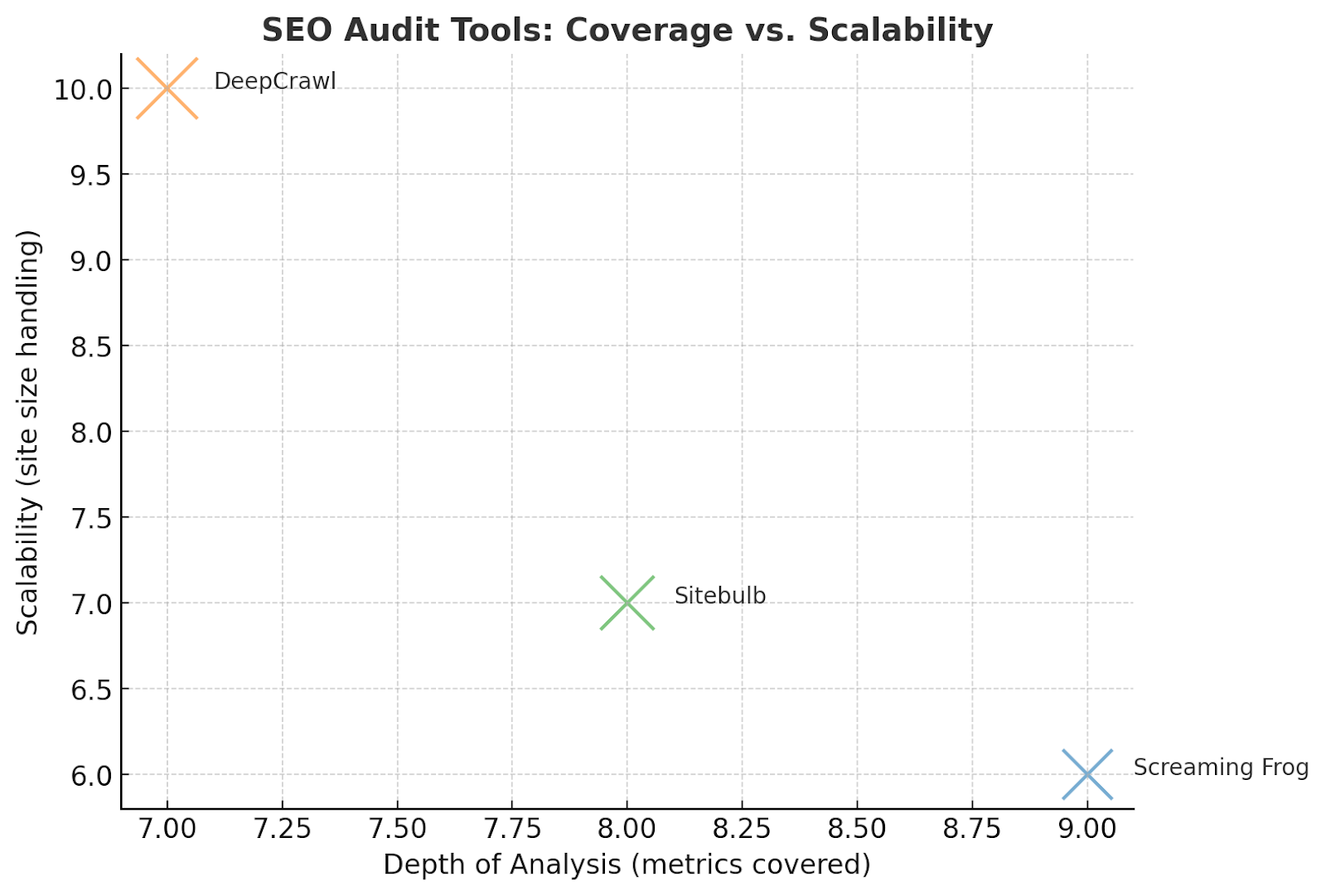
White Label SEO Reporting Software
For agencies, the ability to brand reports matters. Clients don’t want to see six different logos from third-party tools – they want to see your name on the cover. That’s why many operators turn to white label seo reporting tool setups.
AgencyAnalytics, DashThis, or ReportGarden let you automate dashboards, add your own branding, and standardize how results are presented. In fact, some agencies using tools like these report saving up to 60 hours a month on reporting tasks, which can add up to six-figure annual savings.
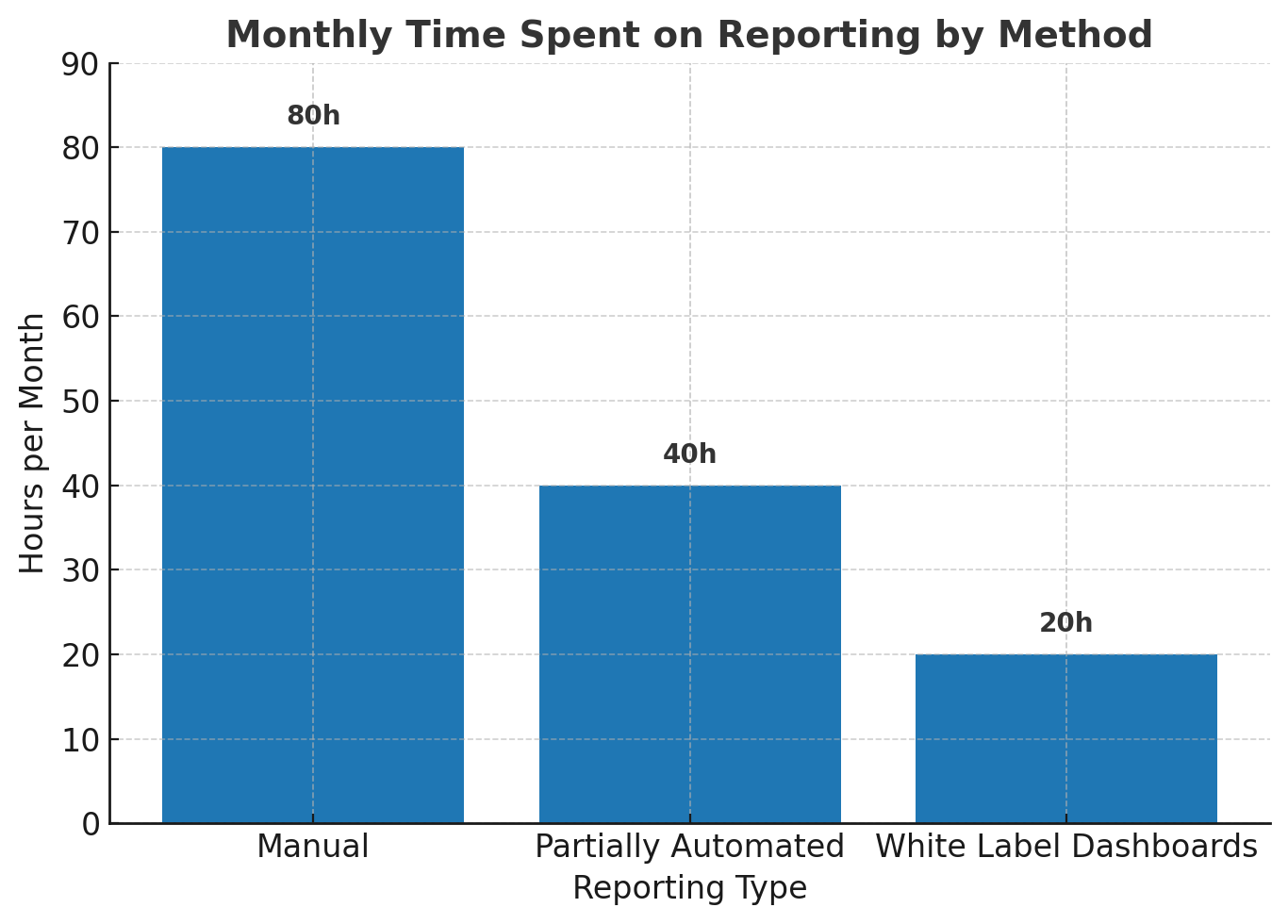
Paired with white label seo software, you can deliver weekly or monthly updates that look really professional. And it’s not just about looks – studies show white-label dashboards can free up 2 hours per week per client and even boost retention rates by 30%, simply because clients feel the reporting is clearer and more consistent.
It’s a small detail, but it shapes perception significantly. A clean, branded report signals maturity, even if you’re still a lean team.
Next, we’ll shift from reporting into research, because tracking results is one thing, but finding the right opportunities in the first place is where campaigns are won.
Tools for Keyword Research and Competitor Analysis
The strength of your keyword research often decides how well you perform. For agencies, it’s not about generating one big list of terms – it’s about building a process that can scale, adapt to client needs, and keep an eye on competitors. That’s why using a seo platform for agencies that goes beyond simple volume data is essential.
Advanced Keyword Research Tools for Agencies
The best seo tools for agency teams today give more than keyword difficulty or search volume. Platforms like Ahrefs, Semrush, and SE Ranking (yeah, we've already covered them) add layers of SERP intent analysis, click-through estimates, and traffic potential by page.
• Ahrefs – strong for content gap analysis, ideal if you’re handling 5–15 active content campaigns at a time.
• Semrush – particularly good for market trend spotting, great if your agency works with clients across multiple regions.
• SE Ranking – lighter and more affordable, often used by lean teams that still need advanced reporting.
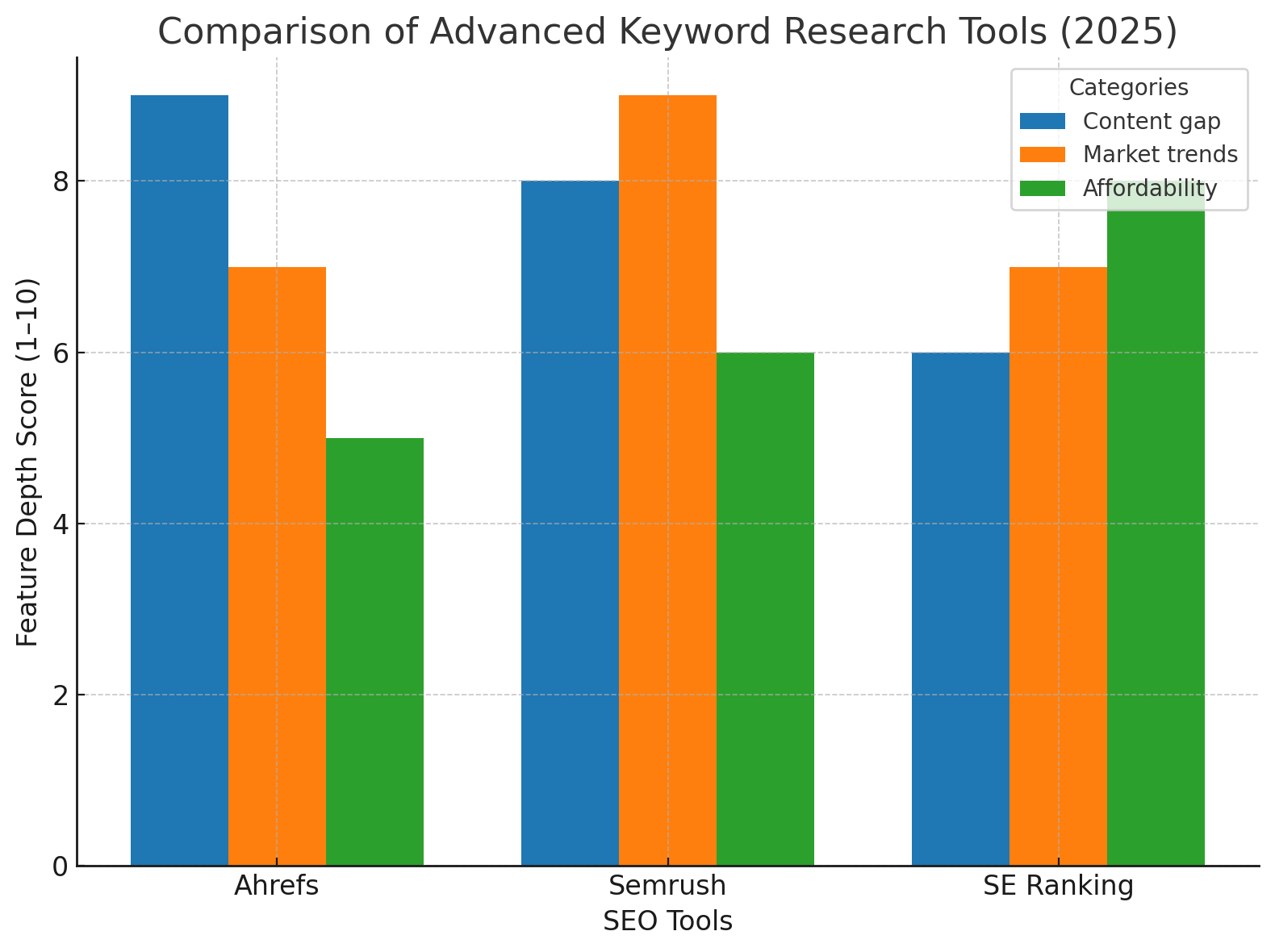
Competitor Tracking Tools
Beyond research, agencies also need visibility on what rivals are ranking for, where their links are coming from, and how their content is performing over time. This is where a seo agency platform that includes competitor tracking comes in.
• SimilarWeb – strong for high-level traffic source analysis, best for agencies with enterprise clients.
• SpyFu – practical for PPC + SEO crossover data, useful if your agency manages both.
• Serpstat – solid for tracking competitors across local markets, often picked by agencies running multi-country campaigns.
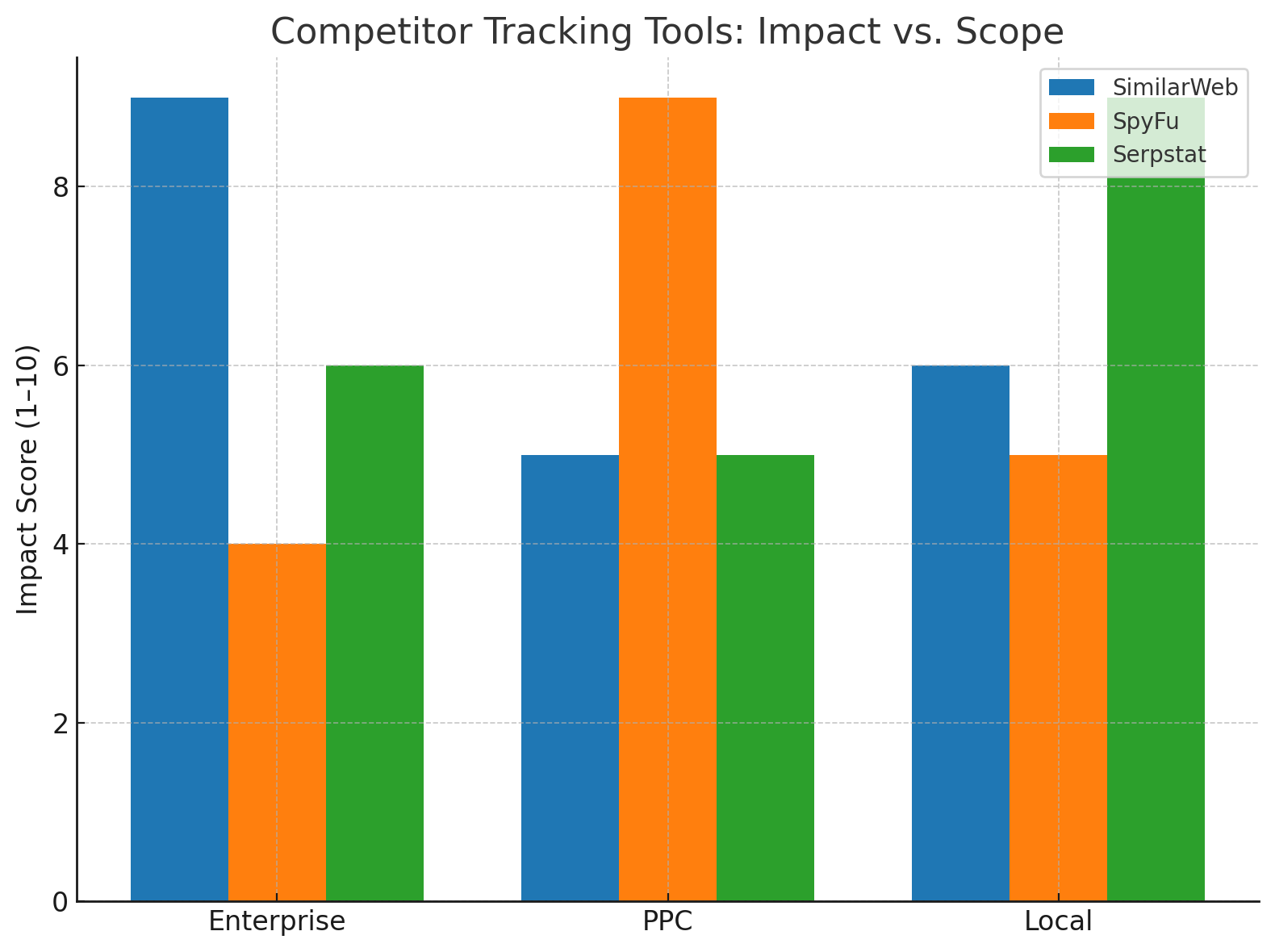
Some providers even offer a seo white label program, letting agencies repackage competitor insights under their own brand. That way, clients see a polished deliverable while your team stays focused on analysis instead of presentation.
Local SEO Tools for Agencies
Local SEO often makes or breaks smaller clients. Whether you’re handling dentists, gyms, or multi-location retailers, the visibility of their listings and reviews drives real revenue. In fact, 46 % of all Google searches carry local intent.
For agencies, that means you need software for seo agency teams that goes beyond generic rank tracking and helps you manage local presence at scale. Many of today’s platforms also ship with a white label seo dashboard, so you can deliver client-ready reports without extra design work.
Local Rank Tracking and Citation Management
Rankings in local packs shift faster than organic SERPs. Tools like BrightLocal, Whitespark or Moz Local help you track positions for specific zip codes or service areas and keep NAP data consistent across hundreds of directories. For agencies juggling multiple clients, pairing these with seo agency management software helps avoid chaos – you can assign tasks, monitor citation health, and automate alerts when something goes off.
Review Monitoring Tools
Reviews directly affect local rankings and click-through rates; platforms like Yext, Birdeye or Grade.us give you a single place to monitor, respond, and even request new reviews. The advantage for agencies is that many of these tools integrate into custom seo dashboards, so your reporting covers both search visibility and reputation in one place. That way, clients see a full picture – rankings, citations, and customer feedback side by side.
Next up, we’ll look at how automation and AI tools are changing the way agencies handle SEO at scale.
Automating SEO Processes with AI Tools
Automation isn’t about replacing your team, but it’s about cutting down the repetitive tasks that drain hours and keeping focus on strategy and client growth. Today, 86% of SEO professionals already rely on AI tools in their workflows, and half of marketing teams have seen a productivity boost of 50% thanks to AI.
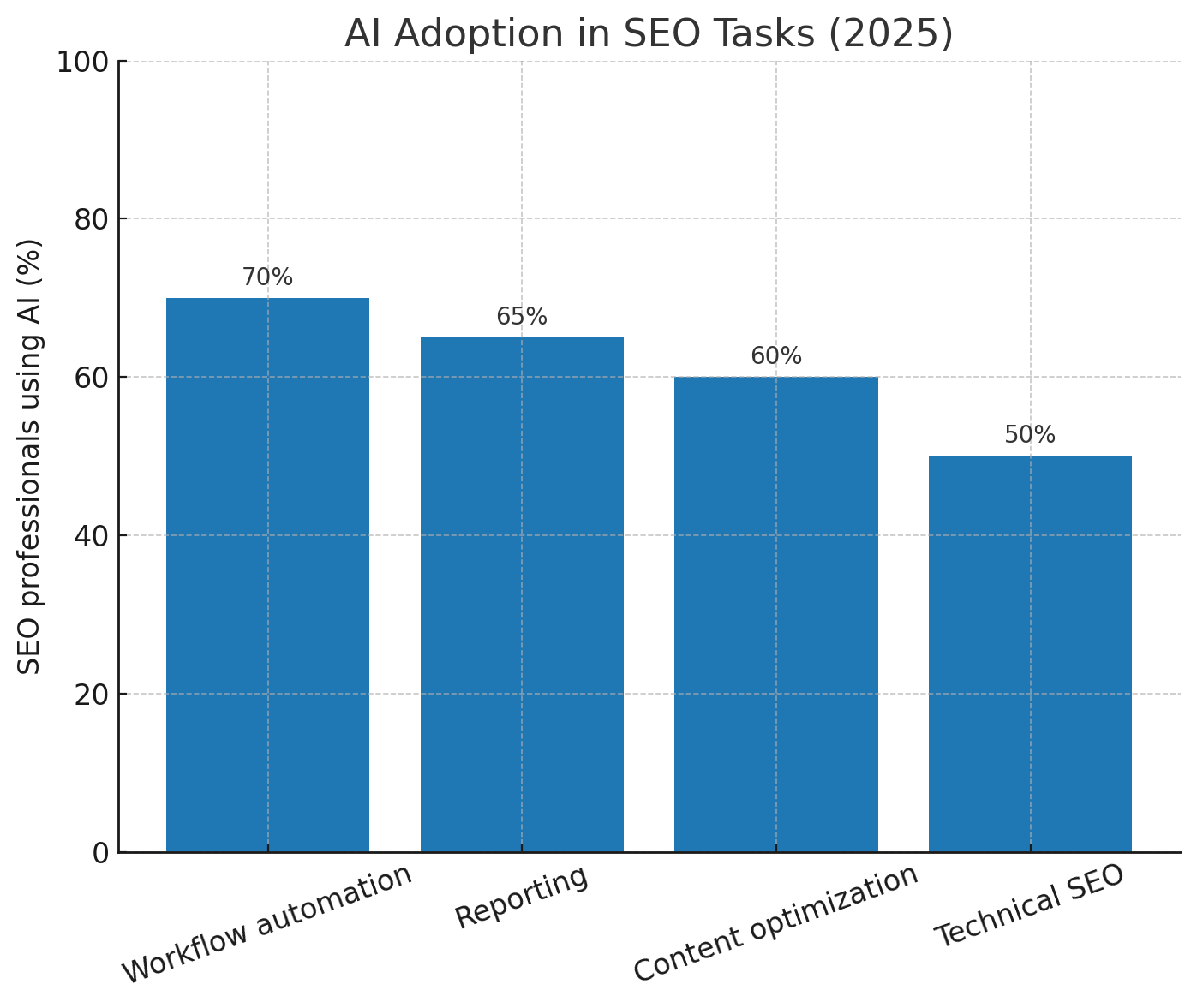
In 2025, more agencies are leaning on seo agency project management software combined with AI features to handle campaign workflows, reporting, and even basic optimizations. Many of these platforms now ship with integrations that can also double as a white label seo platform, letting you run the backend while presenting everything under your own brand.
AI Content Optimization Tools
AI has gone past just generating copy; tools like SurferSEO, Clearscope, and Frase analyze top-ranking content, suggest semantic terms, and benchmark readability. Feeds like Surfer’s AI-powered Content Editor can help agencies produce optimized drafts in as little as 20 minutes – folding hours of work into a few clicks.
Modern seo software for agencies even connects directly to Google Docs or CMS platforms, which means you can go from keyword to optimized draft without manual exports. This speeds up delivery and makes scaling content production realistic even for small teams.
AI-Driven Technical SEO Tools
Technical SEO is often where bottlenecks happen. AI-assisted platforms now crawl sites, flag issues, and even suggest prioritized fixes automatically. ContentKing or JetOctopus keep monitoring live websites, so you catch problems before clients do.
The real win here is efficiency: pairing these tools with the best seo platform for agencies means you’re not just reacting, but proactively managing site health across dozens of accounts. AI highlights what actually matters, while your team stays focused on implementation.
How to Choose the Right SEO Tools for Your Agency’s Workflow
When you’re picking software seo agency teams will actually use every day, it’s less about having the longest feature list and more about how well the tool fits your real workflow. The right stack keeps your people from wasting hours jumping between platforms and makes client delivery consistent without you having to push it uphill all the time.
Factors to Consider When Selecting SEO Software
When agencies talk about the best seo software for agencies, they usually mean software that saves time without creating new bottlenecks. A few questions worth asking before you commit:
• Does it scale with the number of clients you want to handle in the next 12 months?
• How fast can your team onboard? A steep learning curve will kill adoption.
• Does it give reporting and workflow options that match your niche (e.g., local SEO vs enterprise)?
• Can you export or white-label outputs in a way that makes sense for your client base?
Don’t forget the role of private label seo software here. Even if the underlying engine is the same as what competitors use, the ability to present it under your brand adds trust and helps retention. For lean teams especially, that polish is worth more than another minor feature.
Tools That Integrate Well with Other Marketing Platforms
A tool in isolation rarely solves the whole workflow. If you’re running ads, email, or social campaigns alongside SEO – your reporting stack needs to tie it all together. That’s where choosing a solid seo agency reporting software makes the difference.
Look for integrations with CRMs, Google Ads, or analytics suites so your data doesn’t live in silos. The win isn’t just saving time on exports – it’s being able to show a unified view to clients where traffic, conversions, and revenue line up in one dashboard.
In fact, integration efficiency matters – agencies report saving 20–30 hours per month per tool when platforms are properly connected instead of working in isolation.
Next step: once you’ve narrowed down what fits your agency’s workflow, the real growth lever comes from stacking those tools into a system that doesn’t just run campaigns but actually builds margin and scale. And that’s where we’ll head next.
Building a Profitable SEO Agency with the Right Tools
Tools are the foundation, but profitability comes from how you connect them with the way you attract and serve clients. Even the best seo agency software won’t build margin on its own. The best white label seo tool makes your reporting look seamless under your brand.; it gives speed, clarity, and structure – but you still need systems that turn that efficiency into steady revenue.
That’s where automation and client-facing flows step in. Together, they shape the professional layer clients actually see and trust.
But profitable agencies go one step further: they don’t stop at optimizing delivery. They automate how new work comes in. Sales pipelines, onboarding forms, and even platforms like Upwork can be systematized so your team isn’t chasing clients manually.
That combination is what actually turns a tool stack into an agency that scales.
Case Study: Scaling an Agency with Automation
A good example comes from agencies that automated their client acquisition on Upwork. By systematizing how they pitched and responded, 15 digital agencies boosted their Project Value Rate by 120%, Lead Response Rate by 150%, and closed over $8M in contracts. The real lesson wasn’t only in the SEO stack, but in how automation freed teams to focus on delivery while still growing their pipeline.
👉 More details in the full case study
Tool Stack Examples for Different Agency Sizes
To wrap this up, here’s what practical stacks can look like in 2025:
1. Solo or very small agency
All-in-one platform like SE Ranking or Mangools + Google Data Studio for custom seo reports. Keeps costs low and reporting clean while you build the first client base.
2. Small team (3–5 people, up to ~10 clients)
Ahrefs or Semrush + AgencyAnalytics (or similar white label dashboards) + project board in Notion or Trello. Add custom seo reports per client to build retention and upsell.
3. Mid-size agency (15–20+ clients)
Mix of Semrush/Ahrefs + dedicated white label seo software for reporting + CRM/automation for client acquisition. Custom seo reports automated at scale so your team spends more time on strategy than formatting.
4. Large or scaling agency
Full stack with best white label seo software, integrations into CRM, ads, and analytics. At this stage, your margin depends on how tight your automation is – every manual task is a cost.
That’s the real takeaway: SEO tools are the foundation, but profitability comes when you tie them into systems for reporting, client experience, and lead flow. When your stack works as one, you spend less time firefighting and more time compounding growth.




.avif)
.png)
.webp)
